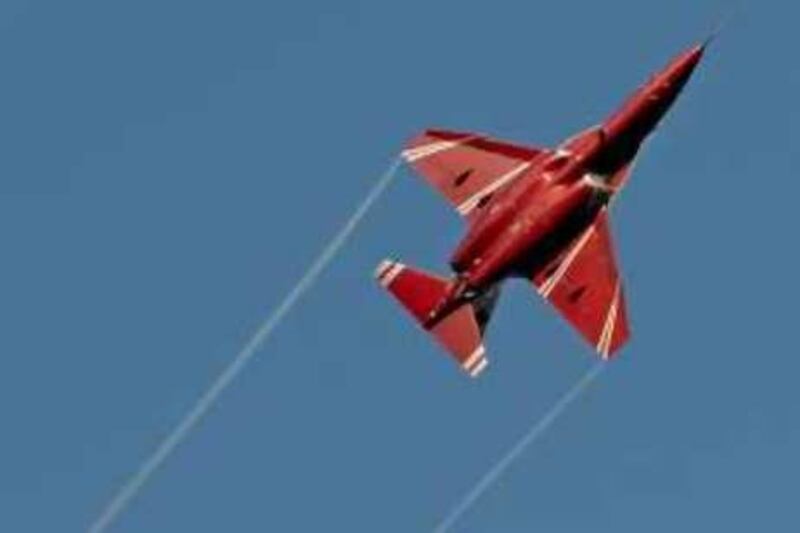ABU DHABI // The UAE is expected to decide this year between three aerospace firms vying for contracts worth as much as US$1 billion (Dh3.67bn) to build up to 54 military trainer jets. The Air Force is replacing its existing fleet of trainer jets, which are used to prepare cadet pilots to fly its more advanced and powerful frontline aircraft, the F-16 from Lockheed Martin. The UAE has invited companies to bid for basic and advanced trainer jets. Alenia Aermacchi, the Italian aerospace firm, is competing with Korean and Swiss aircraft makers for the contract and is the only contestant shortlisted that would provide the UAE with both.
Carmelo Cosentino, the chief executive of Alenia, said the UAE decision could be made this year, with a contract to follow a few months later. "We believe if both aircraft, the M-311 and the M-346, were used together in the same fleet, it would offer the most synergies to the customer," Mr Cosentino said. Alenia, a division of Finmeccanica, is offering the UAE the M-346 - a supersonic, two-seater jet capable of flying to Mach 1.2 as its advanced trainer. It features an avionics system modelled after advanced fighter jets such as the Rafale, from Dassault, and the Eurofighter Typhoon.
The M-346 is competing against the T-50 advanced trainer jointly developed by Lockheed Martin and Korea Aerospace Industries, a state-run manufacturer. The winner will replace the UAE's ageing fleet of Hawk trainers, from BAE Systems. BAE's latest version of the Hawk was reportedly eliminated from the contest last year. Mr Cosentino said the UAE was considering the purchase of between 15 and 24 advanced jet trainers, which could include integrated services and support including flight schools and simulators. A Government spokesman was unavailable for comment.
The UAE, which first formed as a defensive alliance of states in 1971, has invested heavily in its military hardware from US, European and Russian arms makers. In the past decade it has spent an estimated $15bn on F-16 fighters, Mirage jets, tanks and other systems. More recently it has sought to manufacture weaponry within the country - both to create jobs and acquire knowledge - including a proposal to place the final assembly of the M-346 in Abu Dhabi, if the Italian firm is awarded the contract. Alenia has already been contracted to build the M-346 and M-311 in Chile with ENAER, a Chilean aeronautics firm.
The second contest, for basic trainers, is also drawing to a close after more than a year of jockeying between Alenia and Pilatus, based in Switzerland. The UAE has trained its military pilot cadets on the PC-7 from Pilatus, but now it is said to be considering buying between 30 and 40 new basic trainers. The final contestants for the contract are Alenia's M-311, a turbofan jet with a top speed of 740 kph, and the Pilatus PC-21, a turboprop aeroplane.
An M-311, painted in desert camouflage colours, visited the UAE last year. Trainer jets are crucial to prepare UAE pilots aspiring to fly powerful fighter aircraft, said Olinto Cecconello, the flight instructor for the M-346. "It's impossible to have a student with very little experience to go to the F-16 system," he said. The advanced trainers such as the M-346 typically serve as the platform for pilots who have logged between 100 hours and 200 hours of flight training. Both the M-311 and M-346 are still in development mode. The first M-346 jet made its maiden flight on July 7 from the company's headquarters in Venegono.





